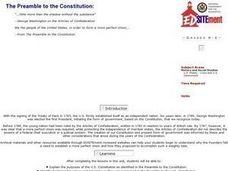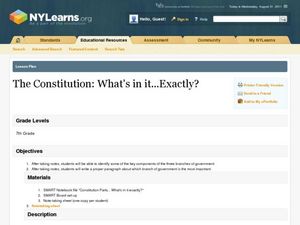Curated OER
Presidents and the Constitution: Lincoln and the Emancipation Proclamation
Students consider the impact of Lincoln's Emancipation Proclamation In this U.S. Constitution lesson, students read a narrative regarding the move by Lincoln to officially end slavery. Students take notes on the case and respond to...
Curated OER
What is Meant by Returning to Fundamental Principles?
What did the Founding Fathers mean by the importance of continually returning to fundamental principles? Your young historians will analyze a series of quotations illustrating the fundamental ideals and principles of the United States...
Curated OER
Why A Bill of Rights?
Examine conflicting viewpoints in this lesson, in which middle schoolers write their own proposal for including a Bill of Rights in the Constitution. As a class, they discover how the Bill of Rights was not a planned document to be...
Judicial Learning Center
The Power of Judicial Review
Marbury v. Madison is arguably the most important landmark case in the history of the Supreme Court. A fact-filled lesson provides background information about the case and two others related to the concept of judicial review. Scholars...
University of California
The Civil War: Secession of the South
Was the Southern states' decision to secede from the Union protected by the United States Constitution? Eighth graders discuss the constitutionality of the South's justification for secession, particularly the secession of South...
Curated OER
It's Your Right: A Civil Rights Brochure
Learners examine the US Constitution, Bill of Rights, and Supreme Court cases in order to broaden their understanding of the US Judicial System. They research a variety of textual and Internet resources to create a tri-fold brochure,...
Judicial Learning Center
Your 4th Amendment Rights
Americans love to learn about their rights, especially those that protect them from the government's power to invade their privacy. Young people are especially engaged by this topic. An informative lesson explores four Supreme Court...
C-SPAN
Presidential Birth Requirement
Every president of the United States must be a natural-born citizen, but the definition of natural-born is not as straightforward as it seems. Secondary scholars examine two points of view surrounding the constitutional requirement and...
Judicial Learning Center
The U.S. Supreme Court
How do Supreme Court justices determine which cases to consider? What happens when the Supreme Court decides not to take a case? The lesson explores important questions and others in the field of criminology. It focuses on the appeals...
The New York Times
Where to Draw the Line: Balancing Government Surveillance with the Fourth Amendment
The question of how to balance Fourth Amendment Rights with national security concerns becomes critical in an age of planned terrorist attacks, election interference, and fake news. Get young social scientists involved in the debate with...
NPR
Progressive Era Lesson Plan
The women working for equal rights in the early 20th century weren't a part of one large group; rather, they were members of dozens of small groups focused on social reform. Explore the ways groups in the Progressive Era like National...
iCivics
Mini-Lesson: Executive Orders
Can the President of the United States pass a law all by himself? Scholars investigate the concept of the executive order in regards to the powers of the presidency. They use current issues and events to monitor media bias while also...
Curated OER
Interview With the Signers of the Constitution
Students work in small groups to develop three questions that a newspaper reporter assigned to cover the signing of the Constitution might have asked each of the following signers of the Constitution: George Washington, Benjamin...
Curated OER
U.S. Constitution Roll Call
First graders simulate the signing of the constitution. In this American history lesson plan, 1st graders take on the roll of newspaper reporters during 1787. Students must pretend to interview signers of the constitution and create a...
Curated OER
Paving the Road to the Constitution
Eighth graders argue for or against the ratification of the U.S. Constitution. In this U.S. government lesson, 8th graders complete four activities that encourage them to examine the strengths and weaknesses of the Articles of...
Curated OER
The Preamble to the Constitution
Students discuss key phrases from the Preamble of the Constitution, find ways to relate the values stated in the Preamble to their daily lives, and explore possible changes needed in the Constitution by future generations of citizens.
Benjamin Franklin Tercentenary
Classroom Constitutional Convention
Students investigate the eight phrases that comprise the Preamble to the U.S. Constitution to determine its principles and purpose. Their own Constitutional Convention is convened to craft a preamble for their school's governance.
National Endowment for the Humanities
Lesson 2: Chief Executives Compared: The Federalist Papers
Fix the Articles of Confederation or develop a new constitution? That was the question facing the Founding Fathers. Several of those in favor of a new constitution published a series of essays, collected in the Federalist Papers, urging...
Curated OER
Decisions, Decisions: The Constitution
Eighth graders, after working with the software Decisions, Decisions: The Constitution, become face to face with the dilemmas, compromises, and struggles of writing the American Constitution. Each student is evaluated on how well they...
Curated OER
The Constitution: What's in It...Exactly?
Seventh graders examine the U.S. Constitution. In this American government lesson plan, 7th graders listen to a SMART Board-supported lecture about the branches of the U.S. government. Students write responses based on the lecture.
Curated OER
U.S. Constitution Roll Call Test
Students act as if they are newspaper reporters from 1787 and they are to interview the signers of the Constitution. Teachers help guide students in what to ask the signers.
Curated OER
The Constitution.
Second graders study the Constitution. They examine the meaning and fundamentals of the Preamble of The Constitution of USA. They assess the importance of having a Supreme Law that states the rights and obligations of the citizens. They...
Curated OER
Constitutional Convention
Students engage in a role-playing situation to illustrate the kinds of compromised that were made a teh Constitutional Convention. They write three short 1-2 paragraph arguments and then present their arguments to the class at the...
Curated OER
Shh! We're Writing the Constitution
Fifth graders research, examine and study about the three branches of the government and the contents of the Constitution including both the Articles and the Amendments. They create their own classroom constitution at the end of the unit.

























